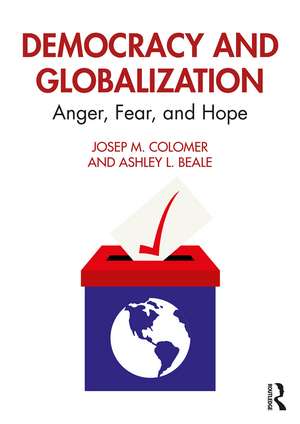Democracy and Globalization: Anger, Fear, and Hope
Autor Josep M. Colomer, Ashley L. Bealeen Limba Engleză Paperback – 13 iul 2020
Part 1 analyzes the split of the middle class and the subsequent political polarization which underlies people’s dissatisfaction with the way democracy works in developed countries. It also addresses the role of political emotions, including disappointments about unmet expectations, anger incited from opposition candidates, fear induced from government, and hope wrapping up new proposals for reform and change. In Part 2, the authors argue that a more effective governance would require reallocations of power at local, national, continental and global levels with innovative combinations of direct democracy, representative government, and rule by experts.
This book will be of interest to students and scholars of political science, comparative politics, international relations, political economy and democratic theory, as well as general readers interested in politics and current events.
| Toate formatele și edițiile | Preț | Express |
|---|---|---|
| Paperback (1) | 361.08 lei 6-8 săpt. | |
| Taylor & Francis – 13 iul 2020 | 361.08 lei 6-8 săpt. | |
| Hardback (1) | 1000.51 lei 6-8 săpt. | |
| Taylor & Francis – 13 iul 2020 | 1000.51 lei 6-8 săpt. |
Preț: 361.08 lei
Nou
Puncte Express: 542
Preț estimativ în valută:
69.10€ • 72.66$ • 57.09£
69.10€ • 72.66$ • 57.09£
Carte tipărită la comandă
Livrare economică 17 aprilie-01 mai
Preluare comenzi: 021 569.72.76
Specificații
ISBN-13: 9780367461928
ISBN-10: 0367461927
Pagini: 172
Ilustrații: 4
Dimensiuni: 156 x 234 x 9 mm
Greutate: 0.25 kg
Ediția:1
Editura: Taylor & Francis
Colecția Routledge
Locul publicării:Oxford, United Kingdom
ISBN-10: 0367461927
Pagini: 172
Ilustrații: 4
Dimensiuni: 156 x 234 x 9 mm
Greutate: 0.25 kg
Ediția:1
Editura: Taylor & Francis
Colecția Routledge
Locul publicării:Oxford, United Kingdom
Public țintă
Postgraduate, Undergraduate Advanced, and Undergraduate CoreCuprins
Introduction: The crisis and the future of democracy Part 1: The Great Disruption: Anger and Fear 1. It is not about development, but effectiveness 2. Less bourgeoisie, less democracy 3. The split of the middle class 4. Nationalists against the European Union 5. Make America divided again 6. India, Indonesia: poor but delivering Part 2: The Global Future: Hope 7. High effectiveness requires multiple governments 8. Local government thrives in an open world 9. National democracy needs multi-party cooperation 10. Continental unions prosper: America, India, Europe 11. Global institutions prefigure a world government 12. There will be more democracies, but it may take a while Conclusion: Should we still call it “democracy”?
Notă biografică
Josep M. Colomer is a political scientist and economist who has been a professor and researcher in his natal Barcelona, Mexico City, New York, and Washington. He is a member by election of the Academy of Europe and a life member of the American Political Science Association. Author of the reference textbook The Science of Politics and two-dozen books about democratization, comparative institutions, electoral systems, European politics, and global governance.
Ashley L. Beale is a policy communications and public affairs professional currently at INGO GiveDirectly. She has worked for the US Senate, UNESCO in Paris, the Indian Parliament, and the Hillary Clinton presidential campaign team to drive issues around democracy, governance and international development.
Ashley L. Beale is a policy communications and public affairs professional currently at INGO GiveDirectly. She has worked for the US Senate, UNESCO in Paris, the Indian Parliament, and the Hillary Clinton presidential campaign team to drive issues around democracy, governance and international development.
Recenzii
"This is an enormously impressive update on what we need to know about democracy. Excellent analysis of democracy's many problems, but also a welcome outline of why we can have hope for a better global future. Really fascinating, insightful, and inspiring." — Arend Lijphart, former President of the American Political Science Association
"Extremely timely and relevant, and likely to remain so. Exceptionally accessible and active for a scholarly book; it is the kind of book which could also have appeal beyond the academic world."— Benjamin Reilly, University of Western Australia, Australia
"A quite unusual global coverage. Particularly appreciated is the inclusion of India, incredibly misconsidered in many international comparative works on democracy. The style is very clear and appealing for a wide audience beyond the academic circle."— Piero Ignazi, University of Bologna, Italy
"This is a much-needed introduction to world affairs, one that ably combines themes in comparative and international politics in a thought-provoking way."— Alfred G. Cuzán, The University of West Florida, U.S.A
"Extremely timely and relevant, and likely to remain so. Exceptionally accessible and active for a scholarly book; it is the kind of book which could also have appeal beyond the academic world."— Benjamin Reilly, University of Western Australia, Australia
"A quite unusual global coverage. Particularly appreciated is the inclusion of India, incredibly misconsidered in many international comparative works on democracy. The style is very clear and appealing for a wide audience beyond the academic circle."— Piero Ignazi, University of Bologna, Italy
"This is a much-needed introduction to world affairs, one that ably combines themes in comparative and international politics in a thought-provoking way."— Alfred G. Cuzán, The University of West Florida, U.S.A
Descriere
As democracy is disrupted by globalization, the solution is to globalize democracy. This book explores the causes of the current crisis of democracy and advocates new ways for more representative, effective, and accountable governance in an interdependent world.
